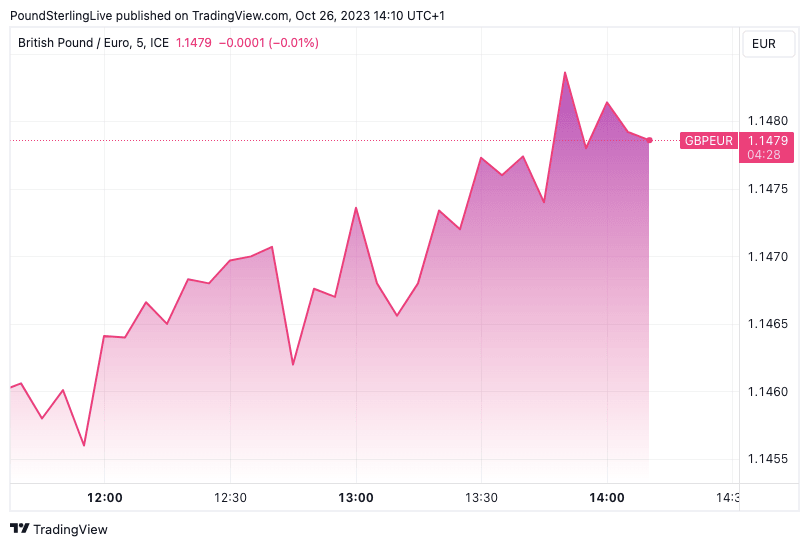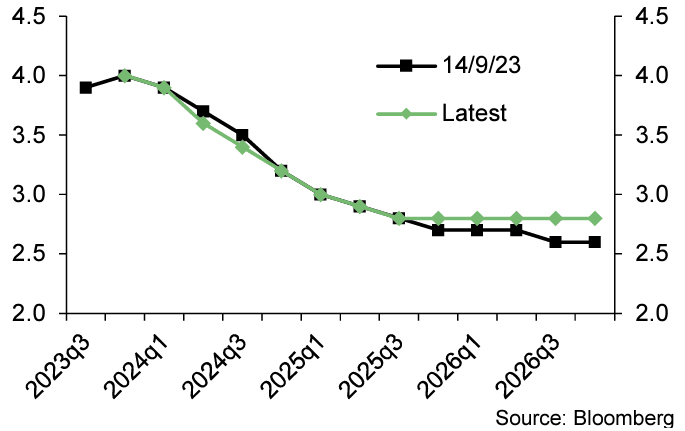Euro Falls Against Pound and Dollar After ECB Decision To Hold Rates And Update Guidance
- Written by: Gary Howes
Above: Pound-Euro upside accelerated following the ECB decision.
The Euro fell after the European Central Bank (ECB) brought an end to a long-running rate-hiking cycle by maintaining interest rates at existing levels while taking note of a recent drop in inflation.
Foreign exchange market participants were well prepared for the decision to keep rates unchanged but were eager to find out if a hike was likely in December or early 2024.
The ECB said it was not content with current levels of inflation and that it stood ready to raise interest rates again, particularly if the data surprised in an unpleasant direction.
Again, this message was expected, given it was far too soon for the ECB to signal it had won its battle with inflation.
But the Euro's pullback from earlier highs against the likes of the Pound, Dollar and other major currencies suggests something of a 'dovish' takeaway for some sections of the market.
Compare Currency Exchange Rates
Find out how much you could save on your international transfer
Estimated saving compared to high street banks:
£2,500.00
Free • No obligation • Takes 2 minutes
We note some analysts are suggesting the following line in the accompanying statement to be important in this regard:
"Inflation dropped markedly in September, including due to strong base effects, and most measures of underlying inflation have continued to ease."
"Higher-for-longer ECB rates is the 'party line'. But they acknowledge that inflation dropped markedly in September... this looks like not just the last ECB hike but a countdown to when we get the 1st cut in 2024," says Viraj Patel, macro strategist at Vanda Research.
Above: Money market pricing shows investor expectations for ECB rate cuts in 2024. Image: Lloyds Bank.
The Euro to Pound Sterling exchange rate is down 0.30% on the day at the time of writing at 0.87, giving a Pound to Euro conversion of 1.1495. The Euro to Dollar rate is softer by a similar margin at 1.0540.
"For the first time since summer 2022, the ECB has not hiked policy rates any further. The ECB says that patience is now key. Only by keeping rates at the current restrictive level for sufficiently long can it be sure that inflation will get back to target. The question is, how long is sufficiently long?" asks Mark Wall, Chief European Economist at Deutsche Bank.
For foreign exchange markets, the question of central bank rate cuts in 2024 is paramount, and we can expect those currencies belonging to the 'early cutters' to come under pressure.
The Eurozone economy continues to deteriorate, with October's flash PMIs revealing a slowdown that was sharper than the market - and the ECB itself - was expecting.
Rising long-term bond yields are not just a U.S. phenomenon but also one being experienced by the ECB, acting to raise the cost of money and helping the ECB's cause to tighten conditions and bring inflation back under control.
"Unless the eurozone economy miraculously rebounds in the coming weeks, we expect today’s dovish pause to eventually be seen as the end of the hiking cycle," says Carsten Brzeski, Global Head of Macro at ING Bank.
The ECB will continue to push back against expectations for rate cuts and this should protect the Euro from any significant weakness ahead of the December 14 interest rate decision which will carry greater heft owing to the release of fresh economic projections.
Once more, the onus now falls on the incoming data releases, which will firm market opinions on where the ECB is headed and determine how the Euro trades into year-end.
Compare Currency Exchange Rates
Find out how much you could save on your international transfer
Estimated saving compared to high street banks:
£2,500.00
Free • No obligation • Takes 2 minutes






